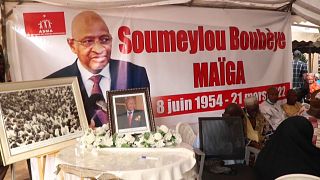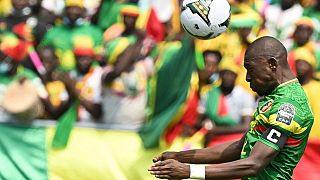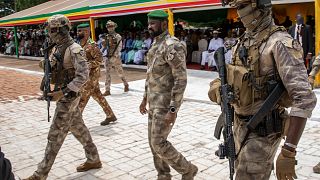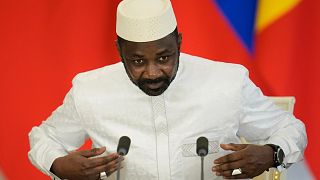Mali
Mali paid a last tribute to former President Ibrahim Boubacar Keita, who died this week, a year and a half after being overthrown by the military, AFP correspondents noted.
The junta that succeeded him and is now holding out against much of the international community organized a national funeral in a military camp in Bamako under the presidency of the so-called transitional Prime Minister, Choguel Kokalla Maiga.
Colonel Assimi Goïta, one of the leaders of the 2020 putsch who has since been invested as president of the transition, was absent.
Ibrahim Boubacar Keïta, who died Sunday at his home at the age of 76 after having stayed away from public life, was to be buried in the afternoon in his vast residence after a ceremony that was both more popular and private.
Nearly 2,000 people, including former adversaries, flocked to his home to say goodbye.
Colonel Goïta, who had taken part in the funerals of two other former Malian heads of state who died in 2020 after the putsch, was officially "prevented" from participating in the official ceremony.
The ceremony was attended by many personalities, former interim president Dioncounda Traoré, former ministers, religious dignitaries, diplomats and one of the sons of the deceased, Boubacar Keïta, in front of the coffin covered with the national flag in the parade ground of the 34th Military Engineering Battalion.
Guinea, also the scene of a putsch in September 2021 and a privileged partner of the Malian junta in the face of international pressure, had sent its foreign minister Morissanda Kouyaté.
Baba Hakib Haïdara, on behalf of the ex-president's collaborators, hailed "a statesman open to dialogue".
He was "a man of spirit, a man of culture, but also, I would say, a man of heart," said his former Minister of Health Michel Sidibé, "he always fought for this country, he had his strengths and weaknesses but what characterized him was his dignity and his patriotism, and this was mentioned today."
"He left a little with his sorrows in his heart," seeing "a country that loved him and that is sinking with these sanctions that have just been taken against us," said his friend the Archbishop of Bamako, Jean Zerbo, referring to recent West African retaliatory measures to push the junta to press for the return of civilians to the helm.
IBK, as he was commonly called, was overthrown on August 18, 2020 by the military, which, after a second coup in May 2021, is now invoking the evils of the past to justify its refusal to return power to civilians in the near future.
The presidency, which began in 2013, has largely coincided with the turmoil in which Mali has been caught since 2012 and the outbreak of independence and jihadist insurgencies in the north.
IBK's fall had been preceded by months of mobilization among a population exasperated by all kinds of violence - jihadist, communal or criminal - by the inaction and bankruptcy of the state and by a corruption reputed to be rampant.
"Dad, chief, my president, my friend, my safe guy," said his son Boubacar, "you instilled in me the love of this country Mali, which you cherished so much and for which you were ready to give everything and forgive everything. The big Malinke (his ethnic origin) that you were could have a volcano heart but you never held a grudge and you did not know how to hate. You had a kindness of heart that we sometimes found hard to understand.
The junta declared a three-day national mourning period starting Friday.












01:01
Chad’s former Prime Minister appeals to Macron after two months in detention
00:44
Mali junta chief extends army rule by five years, rules out elections
01:09
Guinea presents draft for new constitution, referendum set for September
01:12
ECOWAS calls for restraint in violent protests in Togo
01:00
Detained Chadian opposition leader Succes Masra ends hunger strike
01:47
Sierra Leone’s Bio takes over as ECOWAS chair